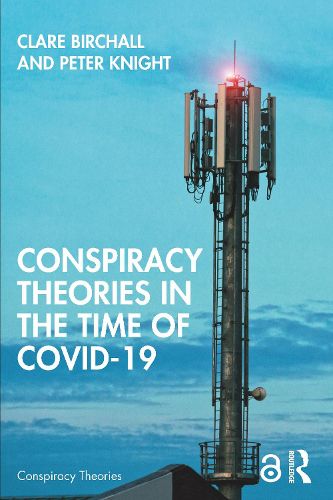Readings Newsletter
Become a Readings Member to make your shopping experience even easier.
Sign in or sign up for free!
You’re not far away from qualifying for FREE standard shipping within Australia
You’ve qualified for FREE standard shipping within Australia
The cart is loading…






Conspiracy Theories in the Time of Covid-19 provides a wide-ranging analysis of the emergence and development of conspiracy theories during the Covid-19 pandemic, with a focus on the US and the UK.
The book combines digital methods analysis of large datasets assembled from social media with politically and culturally contextualised close readings informed by cultural studies. In contrast to other studies which often have an alarmist take on the infodemic, it places Covid-19 conspiracy theories in a longer historical perspective. It also argues against the tendency to view conspiracy theories as merely evidence of a fringe or pathological way of thinking. Instead, the starting assumption is that conspiracy theories, including Covid-19 conspiracy theories, often reflect genuine and legitimate concerns, even if their factual claims are wide of the mark. The authors examine the nature and origins of the conspiracy theories that have emerged; the identity and rationale of those drawn to Covid-19 conspiracism; how these conspiracy theories fit within the wider political, economic and technological landscape of the online information environment; and proposed interventions from social media platforms and regulatory agencies.
This book will appeal to anyone interested in conspiracy theories, misinformation, culture wars, social media, and contemporary society.
$9.00 standard shipping within Australia
FREE standard shipping within Australia for orders over $100.00
Express & International shipping calculated at checkout
Conspiracy Theories in the Time of Covid-19 provides a wide-ranging analysis of the emergence and development of conspiracy theories during the Covid-19 pandemic, with a focus on the US and the UK.
The book combines digital methods analysis of large datasets assembled from social media with politically and culturally contextualised close readings informed by cultural studies. In contrast to other studies which often have an alarmist take on the infodemic, it places Covid-19 conspiracy theories in a longer historical perspective. It also argues against the tendency to view conspiracy theories as merely evidence of a fringe or pathological way of thinking. Instead, the starting assumption is that conspiracy theories, including Covid-19 conspiracy theories, often reflect genuine and legitimate concerns, even if their factual claims are wide of the mark. The authors examine the nature and origins of the conspiracy theories that have emerged; the identity and rationale of those drawn to Covid-19 conspiracism; how these conspiracy theories fit within the wider political, economic and technological landscape of the online information environment; and proposed interventions from social media platforms and regulatory agencies.
This book will appeal to anyone interested in conspiracy theories, misinformation, culture wars, social media, and contemporary society.